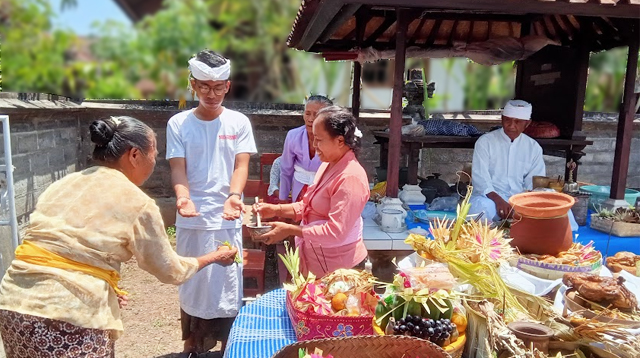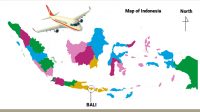BALINESE (Hindu) society has a rich cultural heritage, with deep rituals and traditions centered on maintaining the purity of their self, mind, and sacred places. These practices, deeply rooted in the teachings of Hindu Dharma, shape the daily lives of Balinese people, guiding them in maintaining harmony with the universe and the spiritual world.
The Concept of Purity in Balinese Society
For the Balinese, purity is not just an abstract concept, but a fundamental principle that animates every aspect of life. They believe that maintaining the purity of themselves and their environment is the key to achieving spiritual balance and receiving blessings from God.
Purity is seen as a state of purity that allows an individual to connect with divine energy and stay away from negativity. It encompasses physical, mental, and spiritual purity, all of which are interrelated.
Maintaining the Purity of Self and Mind
The Balinese practice various practices to maintain the purity of themselves and their minds. One important aspect is self-control and mindfulness. They are encouraged to always think positively, speak well, and act virtuously. The concept of Tri Kaya Parisudha (three purified actions: think clean, speak clean, and act clean) is a guideline in daily life.
In addition, physical self-cleansing rituals are also very important. Regular bathing, especially before performing religious activities or entering holy places, is a common practice. Water is considered a powerful cleansing medium, which can dissolve physical and spiritual dirt.
Maintaining the Sanctity of Holy Places and the Environment
Temples (Hindu places of worship) are the center of the spiritual life of the Balinese people, and maintaining their sanctity is a top priority. Every temple, from small family temples to large temples in the mountains, is seen as the abode of gods and ancestral spirits. Therefore, its cleanliness and sanctity must always be maintained.
The separation of areas for certain activities is a clear example of how the Balinese people distinguish between the sacred and the profane in their environment. For example, a place or bucket for washing rice and a place for washing clothes are clearly distinguished. Washing rice, which will be consumed as a staple food, is considered a more “holy” activity than washing clothes, which can be contaminated by worldly impurities.
This separation is done to avoid cross-contamination and ensure that the food remains ritually clean.
Rules and Taboos Regarding Purity
Balinese society has a series of strict rules and taboos to maintain purity. One of the most prominent is that those who have been purified (for example, after performing a metatah or tooth-filing ceremony, or priests) are not allowed to pass under clothes drying. This is because clothes that are being dried, especially underwear, are considered to have come into contact with worldly things and can reduce the purity of someone who has gone through a certain ritual process.
Passing under them is considered an act that can pollute the spiritual purity that has been achieved.
Sleeping Orientation and Sacred Places
The orientation of sleeping or a bed facing a mountain or sunrise is also a practice based on the concept of purity and Balinese cosmology. Mountains, especially Mount Agung, are considered to be the dwelling place of the gods and are a sacred direction.
The rising sun symbolizes new beginnings, enlightenment, and positive energy. By facing the sleeping direction, Balinese people believe they can align themselves with the positive energy of the universe and receive blessings.
Restrictions on Entering Sacred Areas
There are several conditions in which a person is not allowed to enter sacred areas or places, this is done to maintain the sanctity of the temple from negative spiritual contamination. These conditions include:
- If a family member dies and has not performed the post-burial cleansing ritual (Nyekah or Ngaben): Death is considered a moment that causes cuntaka or ritually impure for the bereaved family. During this cuntaka period, the family is prohibited from entering the temple because it is feared that it can mess the sanctity of the place of worship. The cleansing ritual according to the instructions must be carried out first to remove the cuntaka.
- Women during menstruation: Menstruation is considered a temporary state of cuntaka for women. This is not a negative stigma, but rather an acknowledgement of the body’s natural processes that are considered to release energy that is less ritually clean. Therefore, women who are menstruating are advised not to enter the temple or participate in certain ceremonies.
- Women who have not performed postpartum cleansing rituals: Childbirth is also considered to cause cuntaka for the mother and her family. A series of cleansing rituals must be performed after a certain period (usually 42 days or 105 days) before the mother and her baby are allowed to re-enter the temple or engage in other religious activities.
Cleansing Rituals After Paying Respect
After paying respects or attending a funeral ceremony, they will perform a self-cleansing ritual. This is because death and everything related to it are considered to bring cuntaka. This cleansing ritual usually involves bathing and cleansing oneself with holy water or certain flowers, in an effort to remove negative energy or impurities that may have stuck after interacting with death.
Conclusion
Overall, the practices carried out by the Balinese people in maintaining the purity of themselves, their minds, and their sacred places are clear evidence of their deep commitment to religious teachings and cultural heritage. From the separation of washing areas to the prohibition of passing under clotheslines, and from the orientation of sleeping to the restrictions on entering sacred places, each action has a rich spiritual meaning.
These practices not only maintain physical cleanliness, but also aim to achieve spiritual purity, balance, and harmony in life, which is the core of Balinese Hindu Dharma philosophy. (*)










